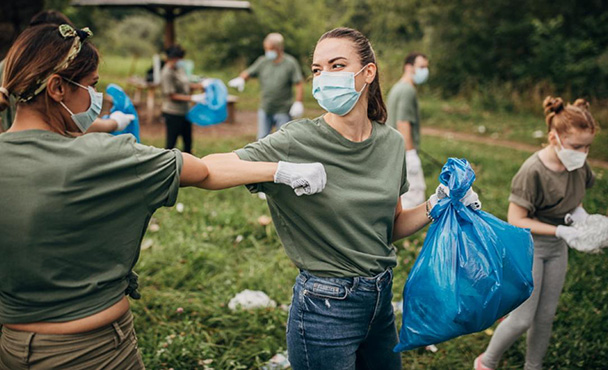The Iglu Guide | Blog
The hidden benefits of volunteering – how helping others can help you too

Every year, almost 6 million Australians will volunteer over 600 million hours of their time. Not only does this provide invaluable help to those in need, it contributes over $200 billion to the national economy as well as bringing some surprising benefits of its own. Here’s why it counts.
Why volunteer?
Volunteer work is a great way to connect with your community and make real-world changes. But it can also help you see the world through a different lens, gain a new perspective and enjoy a sense of contribution and achievement. And even though the idea of squeezing more hours out of your busy schedule may seem downright impossible right now, the fringe benefits that volunteering brings have been proven to be more than worth it. Whilst volunteer work is undoubtably a selfless act of goodness for the benefit of others – right from helping out in the soup kitchen to stacking shelves at the local library, this simple act of giving can also give right back. Volunteering has been proven to improve personal health and wellbeing, as well as helping to refine those important life skills that will be invaluable to your future career. Think timekeeping, accountability, commitment, responsibility and communication. It’s a win-win right there.
What qualities do you need?
Whether your volunteering arrangement is formal or informal, the qualities required will be no different. Reliability, commitment, passion, enthusiasm and a willingness to serve for no financial gain, are all great attributes to take into this world. Students make for great volunteers as they not only have flexibility and more time to give, they are well tuned in to the social network and understand how to get young people motivated.
The benefits
Sense of purpose
Volunteering can help you to engage with the community in a really meaningful way by connecting you to others and adding a real sense of purpose and direction to your work. Whether you’re helping out in an animal shelter or coaching a kids’ sports team, you have the opportunity to make a tangible change in an area that means something to you. It can also help you to focus your passions for the future.
Improved personal wellbeing
Volunteering has been proven to help reduce symptoms of depression and enhance physical health and wellbeing. It can help to build personal confidence as well as counter the effects of stress and anxiety. Regular interaction with others that takes you away from the daily grind has been known to improve both your mood and outlook. Simply put, helping others out makes us feel more happy!
Increased employability factor
Volunteering can help you gain experience in a related area as well as connect with others in that field. Employers look for graduates that have demonstrated they are willing to go above and beyond what is required from them. So even if your volunteering falls outside your field of passion, it’s the perfect way to gain important workplace skills such as teamwork, project planning, communication and time management. Taking the time to have some real-life experience outside of studying is another great way to enhance your future job prospects.
Gain perspective
If you get bogged down in studying and exams, volunteering can help you escape the daily routine and experience an entirely new environment far away from the world of academia. It can also help find some focus on what’s really important to you as you discover new pathways and spark new interests. Volunteering overseas is the perfect way to experience another culture, push yourself outside your comfort zone and gain a wider perspective on life.
You get to meet some great people along the way!
Volunteering organisations bring together all sorts of different people from all walks of life. It’s a great way to build new relationships that may be useful for the future – as well as meet people you may not have come across otherwise. If you’re studying hard, you might not have much time for socialising, and that’s where volunteer work can provide the perfect combination. You are all there for the same reason, and that commonality and shared experience is something you can treasure forever.
So, what now?
If you’re ready to get going but are stuck for ideas, have a think about what might best complement your chosen field of study. Medical students might consider volunteering with the Red Cross or in an aged-care facilitity, whereas economics students might think about roles in a more financial setting. Follow your passions and you can’t go far wrong because the sheer fact that you are giving up your time for others is the most important aspect.
Volunteering can be undertaken in many different settings, whether personally arranged or through a community organisation or charity. Try Go Volunteer, the Centre for Volunteering or Seek Volunteer for starters, and even if the volunteering role seems unrelated to your study, the skills and benefits you acquire are entirely translatable.


